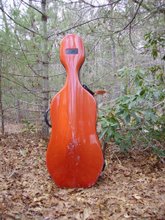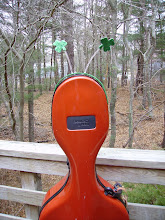Emily Wright at Stark Raving Cello Blog had a very interesting post recently about Teaching Your First Lesson. I read it, thinking, wow, my cello teacher would never recommend that. And I thought of another teacher who was appalled by "instrument petting zoos," in which someone (like me, specifically me) lets others, usually children, try out a violin, viola, or cello, seeing what it feels like to hold a bow and play some notes. She (the other teacher, not mine) thought the danger of my teaching the child something inappropriate was far greater than the benefits to be gained by the nonmusician or prospective musician experimenting with an instrument.
In other words, only a music teacher should be teaching, and technique must be proper from the beginning. You should hold the bow for a week before applying it to the strings, and you should spend another week pizzing. Something like that. Meanwhile, I would teach "Mary Had a Little Lamb" or "Old Joe Clark" to interested attendees at instrument petting zoos, in a half hour or so.
I am happy to see that my teacher is now encouraging "practicing buddies"--pairs of students who practice together between lessons. The less experienced one pays the more experienced one for his or her time, so it is similar to having the more experienced student teach, though still with the training wheels of her lessons for both. It's a nice idea for those lessonless times: summer vaction, Christmas vacation, etc., too. The more experienced student can be any age, even middle school.
In a way, our orchestra sectional rehearsals have been like group practice buddies this fall, except no one is paying each other. It builds self-confidence too, as we offer suggestions to each other and figure out bowings and fingerings, rather than just follow along. I will miss the sectionals and the rehearsals, but could use a little break after the concerts!
Subscribe to:
Post Comments (Atom)












5 comments:
You just hit one of my hot buttons. The idea that only a music teacher can teach music is pure arrogance. And my other not-so-humble opinion is that the teacher who is not confident that their student can teach another player a thing or two has done a half-way job of teaching themselves.
To paraphrase an aphorism, if only a few birds may teach others to sing, soon the world will be filled with mute birds.
Hi M: So sorry to hear of the string shop closing, I know that you will miss it much. Doris
I've been trying to get some sort of practice buddies thing working in our orchestra, but it's not taking. We have a large section this year (10!), but three of them are younger hs students who could really use the mentoring a bit.
And I'm sorry to hear of that shop closing, too. It's always sad when a community building business shuts down.
In the good old days of novice, apprentice, journeyman, master,the teacher would be only one year or two years ahead of a student. Being closer to a student's level gives greater empathy and patience. They still use this method in the martial arts.
How did I miss this one?
I agree with GGP, as usual. How do you think one gets to be a great teacher? It's not by being the best player; it's by teaching. The paths are parallel, not simultaneous. In college, when I was about 70% of the cellist I am now, I was 10% of the teacher I am now. By the end of my junior year, I was up to 50% of the teacher I am now. I began teaching when I was about 12...my father was a little interested, and since he is also a teacher, he knows well that having to explain something helps make it clearer to the teacher, too. As I taught and led sectionals and took on classroom roles for a period, I saw that my knowledge base hadn't broadened so much as my ability to convey the best way to go about things, as well as interact with people had improved. Now I find that much of teaching has to do with disarming the natural defensive inclinations we come across, especially with adult students. You guys know so much that it is sometimes hard to really admit the depth of non-assuredness the cello (and lots of things) present us with. I feel like I am a lucky soul to have all of the same defense mechanisms, difficulties with discipline and general human frailties that my students do. It is from there that I can sympathize and demonstrate a way forward. That has nothing to do with being an excellent cellist and everything to do with human experience, which is why I so strongly advocate students taking on students of their own. Share what you have. There is no magic, just effort. Just like anything else.
Post a Comment